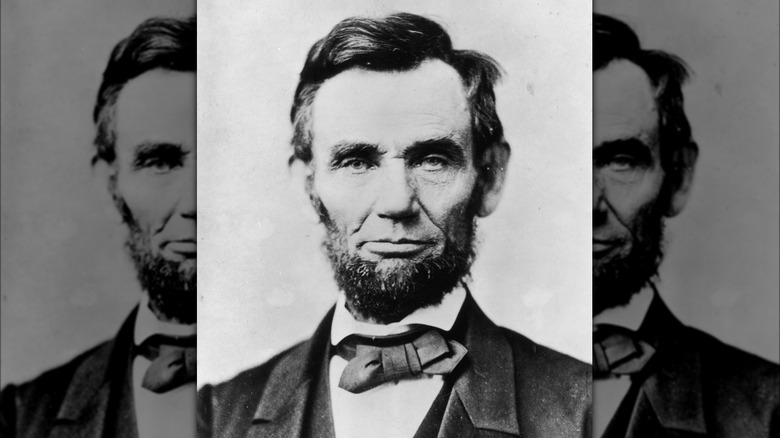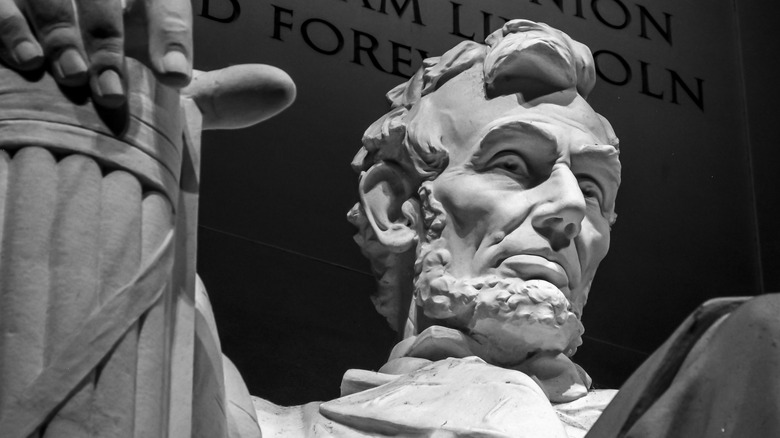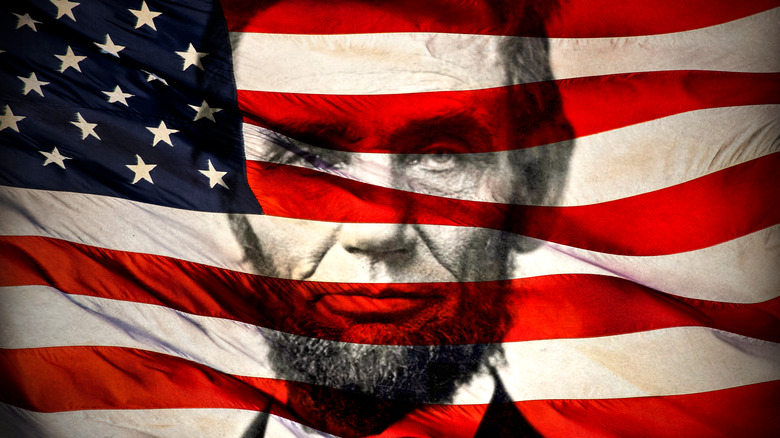The Controversial Abraham Lincoln Letter That Appears In War Epic Saving Private Ryan
Each of the United States of America's presidents has made their own mark on the nation. They have led the country through wars. They have presided over the highest highs and the lowest lows. They have engaged in harsh battles, domestic and international, and have made the tough decisions that only one in their lofty position could make. Some of these decisions, naturally, have been more popular than others, and universal popularity is completely impossible. Still, Abraham Lincoln is among the most admired and significant leaders in United States history.
Honest Abe is an enduring figure in American history. As iconic as his characteristic top hat, he rose from almost nothing (at the end of 1816, Lincoln, not yet 7 years old, lived in a small cabin his father built on public land in Indiana) to become the most powerful politician in the country (via Britannica). Revered by many and an endlessly significant character in his nation's history, Lincoln's scholarship continues to pore over every detail about him, and there are still intriguing mysteries. One particular letter he reportedly wrote is a perfect example — it seems to have inspired the Tom Hanks-starring classic "Saving Private Ryan." Yet Lincoln may never have written it at all.
What was the Bixby Letter?
Per History, it was the president-to-be's election victory that sparked the formation of the Confederate States of America. A total of 11 Southern states seceded, and what followed was a terrible, protracted and costly conflict indeed. The National Park Service reports that the Confederate Army had an enlistment strength of up to 1,227,890 soldiers (estimated, as records have been lost), and the Union Army's was 2,672,341. The carnage was terrible: The outlet reports that the battle of Antietam saw 22,726 casualties, though it lasted only a single day.
According to History, 620,000 soldiers were killed. It was a paradigm-shifting, tragic, monumental conflict, one that tore families apart and left millions bereft. It was a time for a charismatic leader such as Abraham Lincoln to seek to unite, not divide; to assure his people that he was there with them, and to offer solace. It is said that he personally wrote to a woman who had lost several close family members in the conflict, but as significant as the letter has become, it seems there's doubt that he himself wrote it at all.
As the New England Historical Society reports, the so-called Bixby Letter was written to one Lydia Bixby late in 1864. Bixby lived in Boston and had, the letter claimed, lost far too much during the conflict. "I have been shown in the files of the War Department a statement of the Adjutant General of Massachusetts that you are the mother of five sons who have died gloriously on the field of battle," the letter begins, offering the most eloquent of condolences.
Abraham Lincoln's secretary may have written the letter
"I cannot refrain from tendering to you the consolation that may be found in the thanks of the Republic they died to save," the missive goes on (per the New England Historical Society) in words that are referenced and echoed in 1998's "Saving Private Ryan." The movie, and the tragic situation Abraham Lincoln seemingly writes of, both revolve around the notions of love, loss, and of causes worth fighting and giving everything for. The film is set during World War II.
Though the letter is marked "Executive Mansion, Washington," and signed "A. Lincoln.," per the New England Historical Society, a lot of controversy surrounds it. Per History, the letter was published by the Boston Evening Transcript four days after Bixby reportedly received it in November 1864. It was widely circulated, as presidential missives were at the time. The outlet suggests, however, that the letter was probably written by John Hay, the president's secretary.
American Heritage states that some turns of phrase in the letter were typical of Hay but not of Lincoln. Nevertheless, Massachusetts governor John A. Andrew personally asked the president to write a letter to the grieving mother on hearing her story. It seems uncharacteristic of Lincoln not to have done so personally.
Ultimately, it's the words that matter
Definitive evidence has proven elusive, and perhaps it always will be. It's the sentiment that's important, though the facts should be too: Per History, "only two of [Bixby's] sons actually died fighting during the Civil War. A third was honorably discharged and a fourth was dishonorably thrown out of the Army. The fifth son's fate is unknown."
Kendall Banning wrote a piece entitled "The Case Of Lydia Bixby" for "The Bookman" in February 1922. Banning states that there were four Bixby cousins of Lydia's sons, all of whom served together. "The two families were closely associated," the author writes, suggesting "it is possible that the records of these nine Bixby boys became mixed."
A lot of mystery surrounds the Bixby letter and its many copies. Ultimately, it's a touching and beautiful piece, and it continues to capture the imagination and bring solace to those who have suffered loss, whether Lincoln truly wrote it or not.



